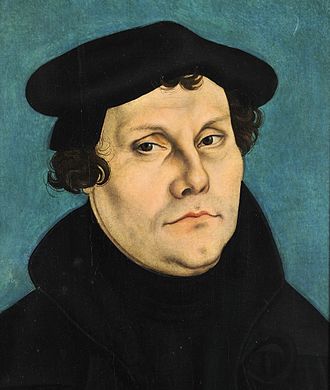Never Darken My Altar Again – It Happened Today, January 3, 2017
 On this date in 1521, January 3, Martin Luther was excommunicated. And frankly it served him right.
On this date in 1521, January 3, Martin Luther was excommunicated. And frankly it served him right.
Now perhaps this view might trigger controversy. In the modern world it might even "trigger" people, whatever that means. Many of them seem to be sprinklers or something. But the simple fact is that Luther’s teachings were, by 1521, incompatible with Roman Catholic doctrine.
The odd thing about many criticisms of Luther’s excommunication is that they seem to come from people whose ideas are also incompatible with Catholic doctrine. Which being the case, I don’t see why you’d want to be in communion with that particular church or to feel resentment that a person who rejected its views should be told in no uncertain terms not to darken the altar again.
To be sure, there was a major issue at the time to do with the entanglement of God and Caesar. The Roman Catholic Church was not "that particular church" in those days. It was "the church" and had a nasty habit of seeking to exert secular power very directly, grasping the wrist of the hand that held the sword. And I can find much to criticize in the secular and political consequences of being cast out of communion with it in 1521 in Germany. But to say so is not to say that the church ought not to have told people then, or that it ought not to tell them now, that there are certain core doctrines on which it is necessary to accept the official Vatican position if one wishes to take the communion wafer and wine in a Roman Catholic mass. The modern world being what it is, this point is often strangely obscured. For instance National Geographic asserts that "Months earlier, Luther had written a pamphlet criticizing many aspects of the church, including nepotism, corruption, and the sale of indulgences. Indulgences were grants that could be bought to allow the buyer to escape spiritual punishment for misdeeds. Luther had been warned that his views may lead to his excommunication, and refused to recant them." And it goes on to say that "In spite of his excommunication, Luther remained very popular. His outspoken belief in reform inspired the Reformation."
To some extent this canned version of Luther the brave dissenter is correct. And there was much to dislike about the manner in which the Catholic church conducted its affairs in those days, and in others. Indulgences in return for money were especially crass, and Luther took rightful aim at the alleged slogan "As soon as a coin in the coffer rings, a soul from purgatory springs." But these were corrupt practices not dogmas, which many Catholics strove mightily to reform within their own church, and with considerable success, in the wake of the "Reformation".
Luther went much further. In addition to rejecting many of the Catholic sacraments, he actually denounced to the whole notion of salvation through good works. And while the relationship between free will and grace is a very complicated doctrine on which many Protestants and Catholics are beginning to suspect they do not differ as greatly as they once thought, I consider pure predestination a loathsome doctrine that simply cannot be true as it reduces life to a cruel puppet show. Whether you agree or not, there is no room for argument that Catholicism insists on the efficacy of good works under some circumstances. In rejecting that idea, Luther rejected the church and not the other way around.
It should also be noted that while his views on the subject of church and state are complex to the point of apparent inconsistency, Luther’s theology led in practice and during his lifetime not to a separation of the two but to the establishment of Lutheran and other Protestant churches in those parts of German where the ruler was of such persuasion, and the enforcement of theological orthodoxy in a manner at least as ruthless as in areas that remained Roman Catholic. So on the main point on which he might receive interdenominational praise, for resisting the rendering unto Caesar of that which is God’s, he is by no means clearly or entirely innocent. He was also a gruesome anti-Semite although in that respect, alas, he again resembled the 16th-century Catholic church to the great discredit of both.
However that may be, the basic point remains. By 1521 Luther was not an orthodox Roman Catholic and he openly challenged the church not only on its unsavory practices but on its core doctrines. For that he was shown the cathedral door on Jan. 3, 1521, and rightly so.